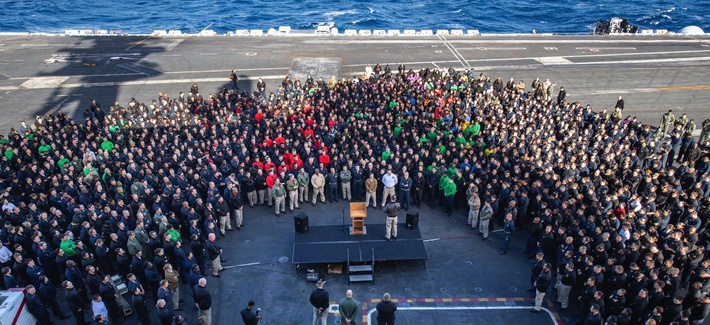
UPDATE:
The initial uproar about Captain Crozier’s reaction to the coronavirus outbreak aboard the Theodore Roosevelt was the “too widely dissemination” – even the alleged leaking – of Crozier’s email where he pleaded for help in fighting the virus outbreak aboard his ship and the allegation that Crozier had not “followed the chain of command.”
In his now-famous letter raising alarm over the uncontrolled contagion aboard his ship and calling for the urgent evacuations of most of the sailors off the ship, Crozier wrote: “We are not at war. Sailors do not need to die…If we do not act now, we are failing to properly take care of our most trusted asset — our Sailors.”
Now, in its “new findings,” the Navy says while “the email and the leak were the genesis of all of this…[it] isn’t about the email and it’s not about the leak.”
Rather, the Navy now claims:
In reviewing both Adm. Baker and Capt. Crozier’s actions, they did not do enough, soon enough, to fulfill their primary obligations and they did not effectively carry out our guidelines…
Crozier was initially relieved of his command of the Roosevelt by the Navy while the investigation proceeded.
Then it took a political turn when Trump chimed in claiming Crozier’s letter “was terrible.”
“I mean, this isn’t a class on literature…This is a captain of a massive ship that’s nuclear powered, and he shouldn’t be talking that way in a letter. He could call and ask and suggest,” Trump told reporters.
Spencer Ackerman at The Daily Beast perhaps summarizes this sorry saga best.
Navy Capt. Brett Crozier has been vindicated after warning of a dire coronavirus outbreak aboard the USS Theodore Roosevelt—just not by the Navy, which on Friday announced that it will not reverse Crozier’s firing for the infraction of trying to save his sailors’ lives.
Instead, the Navy leadership implied that Crozier was responsible for the outbreak that he loudly warned he needed urgent help from the Navy to redress.
Original Post:
The New York Times reports that the Navy has concluded its investigation into the actions of Capt. Crozier when he pleaded for help in fighting the coronavirus outbreak aboard the Theodore Rooselvelt
According to The Times, the investigation “concluded that the two top officers aboard the aircraft carrier Theodore Roosevelt [Capt. Crozier and Rear. Adm. Stuart P. Baker] made poor decisions in response to the outbreak of the coronavirus onboard the aircraft carrier.
As a result, The Times adds, “Capt. Brett E. Crozier will not be restored to command of the virus-stricken ship, and his boss onboard, Rear. Adm. Stuart P. Baker, will have his promotion to two-star admiral put on hold.”
The saga of the Theodore Roosevelt and its courageous Captain started on January 17, when the USS Theodore Roosevelt with its strike group departed Naval Base San Diego with 4,865 healthy sailors aboard and with Capt. Brett Crozier in command on a deployment to the western Pacific.
A saga that caught the nation’s attention when the carrier’s commander put the health and lives of his crew above his own career and a saga that had many ups and downs, twists and turns, policy reversals, impasses, Navy public relations snafus, Department of Defense indecision and political influence and interference at the highest levels.
A saga that may not have yet reached its conclusion.
Read more about how it evolved here, here, here, here, and here.
















